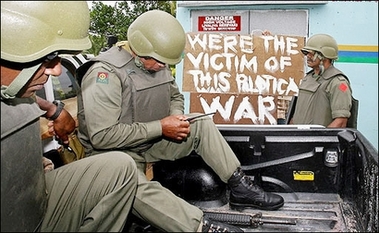Uneasy calm in Fiji after coup
(AFP)Updated: 2006-12-06 10:53
SUVA - An uneasy calm has settled on Fiji's capital, a day after a bloodless military coup that world leaders condemned as an outrage which would plunge the fragile nation into economic hardship and isolation.
But as the military censored media and prepared to install an interim government, Qarase flew out of the capital Suva to his home on a remote island of Fiji after being ordered out of his former official residence.
"I have not resigned, I will not resign and legally I am still the prime minister," he told the Australian Broadcasting Corporation (ABC) amid a chrous of international condemnation of the coup.
Qarase, who earlier appealed to his people to stand up and "fight for our democracy" through peaceful means, said he believed they would heed his call.
"I believe there will be a peaceful reaction by thousands and thousands in the next few days and I believe that may change things," he said.
Suva was calm and remained under a tight military presence Wednesday morning. Many residents headed to work after Bainimarama urged Fijians to continue life as normal.
Roadblocks manned by soldiers around the prime minister's office were cleared Tuesday evening but Bainimarama said others would be set up at key locations around the country over the next few days.
Soldiers patrolled the area around parliament and the headquarters of the police's tactical unit, which was disarmed Monday, after the acting police chief called the coup unconstitutional and illegal.
Australia's Foreign Minister Alexander Downer condemned the "disgraceful" military action and warned that Fiji would be shunned by the world community and that its economy would suffer.
"We are of course outraged by the behaviour of Commodore Bainimarama and the statements he has been making since he took over," Downer said.
"The Fiji military commander and his supporters should be in no doubt that their coup will bring a prompt and sharp international reaction.
"The Fiji economy, already affected by the military's actions, will be badly damaged and the people of Fiji will suffer even more," he said.
Australia and New Zealand have already announced sanctions, including a halt to defence cooperation and a travel ban on Bainimarama and other military officers.
"We are going to be very tough on these people," Downer told ABC. "This is simply a disgraceful thing that has been done by Commodore Bainimarama."
Downer said Australia strongly supported efforts to suspend Fiji from the Commonwealth, a move that the organisation's Secretary-General Don McKinnon said was likely to come Friday.
The United States also announced a suspension of aid as UN Secretary General Kofi Annan, the European Union and countries including Britain, Japan and France decried the coup and called for Qarase's reinstatement.
New Zealand Prime Minister Helen Clark said the fate of the Pacific nation was now up to Fijians themselves.
"I think the fate of Fiji now is very much in the hands of the Fiji people," she said, calling on military officers to uphold the constitution by defying Bainimarama.
"The military commander's whole strategy is based on people just accepting this passively and letting life go on but I think there are signs across Fiji society ... that people do not like what they see," Clark said.
Fiji's political leaders and its acting police chief criticised the coup, but media censorship by the armed forces meant many here did not hear their condemnations.
The leader of the Fiji Labour Party, Mahendra Chaudhry, who was deposed as Fiji's first ethnic Indian prime minister in a 2000 coup and held hostage for 56 days, said Tuesday's military takeover was a sad day for Fiji.
"We just can't get out of the coup culture," Chaudhry told the Daily Post newspaper.
|
||
|
||
|
|

